-
- About the Department
- Vision
- Mission
- Program Educational Objectives (PEOs)
- Program Outcome (POs)
- Program Specific Outcomes (PSOs)
- Faculty
- Magazines
- Syllabus & Course Outline
- Laboratories
- Practices & Innovation in Teaching Learning
- Professional Society
- Departmental Activities(Guest Lectures & Industrial Visits)
- Academic Calendar
- Project
- Research & Development
Department of Bio-Technology
Biotechnology refers to the technical application of Biological systems or living organisms to make or modify products or processes for specific uses. As a leader among top Biotechnology colleges in Lucknow, we define Bio technology as the use of microorganisms such as bacteria, yeasts, or biological substances such as enzymes, to perform specific industrial or manufacturing processes.
Bio technology has wide areas of application in Agriculture, Animal Husbandry, development of Medicines and Vaccine, treatment of prolonged disease, pollution control and waste management and ecological conservation, energy production and conservation and many more. A Biotech college in Lucknow has enormous potential to produce batches of efficient & accomplished engineers who can shape the very economy of Uttar Pradesh with their trade.
Vision
To become a centre of excellence and develop biotechnologists to formulate ethical solutions for the betterment of mankind.
Mission
- M1- Enabling environment for effective teaching-learning process with incorporation of multidisciplinary approaches to meet the global challenges in the field of biotechnology and related domains.
- M2-.Generating trained manpower groomed in biological techniques to make an employable and successful entrepreneur.
- M3- Imparting professional, social and ethical values for solving the biotechnological problems of society, nation and the world at large.
Program Educational Objectives (PEOs)
- PEO1:- Graduate will excel in higher education, employability and research in related domains of biotechnology with the help of multidisciplinarytools and techniques.
- PEO2:- Graduates will be able to identify and solvereal life problems with their critical thinking and ability to innovate in the field of biotechnology and related domains.
- PEO3:- Graduates will be skilled with a zeal for continuous learning for their professional career.
Program Outcome (POs)
Engineering knowledge
Apply the knowledge of mathematics, science, engineering fundamentals, and an engineering specialization to the solution of complex engineering problems.
Problem analysis
Identify, formulate, review research literature, and analyse complex engineering problems reaching substantiated conclusions using first principles of mathematics, natural sciences, and engineering sciences.
Design/development of solutions
Design solutions for complex engineering problems and design system components or processes that meet the specified needs with appropriate consideration for the public health and safety, and the cultural, societal, and environmental considerations.
Conduct investigations of complex problems
Use research-based knowledge and research methods including design of experiments, analysis and interpretation of data, and synthesis of the information to provide valid conclusions.
Modern tool usage
Create, select, and apply appropriate techniques, resources, and modern engineering and IT tools including prediction and modelling to complex engineering activities with an understanding of the limitations.
The engineer and society
Apply reasoning informed by the contextual knowledge to assess societal, health, safety, legal and cultural issues and the consequent responsibilities relevant to the professional engineering practice.
Environment and sustainability
Understand the impact of the professional engineering solutions in societal and environmental contexts, and demonstrate the knowledge of, and need for sustainable development.
Ethics
Apply ethical principles and commit to professional ethics and responsibilities and norms of the engineering practice.
Individual and teamwork
Function effectively as an individual, and as a member or leader in diverse teams, and in multidisciplinary settings.
Communication
Communicate effectively on complex engineering activities with the engineering community and with society at large, such as, being able to comprehend and write effective reports and design documentation, make effective presentations, and give and receive clear instructions.
Project management and finance
Demonstrate knowledge and understanding of the engineering and management principles and apply these to one’s own work, as a member and leader in a team, to manage projects and in multidisciplinary environments.
Life-long learning
Recognize the need for, and have the preparation and ability to engage in independent and life-long learning in the broadest context of technological change.
Program Specific Outcomes (PSOs)
- The ability to build a bright career in biotechnology fields like pharmaceutical, microbiology, medical technology along with competence of working in multidisciplinary projects.
- The ability to apply the existing and innovative theoretical and practical knowledge to handle unpredictable situation such as biological war, chemical war and pandemics.
Faculty Of Bio-Technology
| Name of the Faculty | Designation | Department | Highest Qualification |
| DHEERENDRA KUMAR | ASST PROFESSOR(HOD) | BIO TECH | PHD |
| TABREZ JAFAR | PROFESSOR | BIO TECH | PHD |
| ASHISH PANDEY | ASST PROFESSOR | BIO TECH | M TECH |
| AJIJUR REHMAN | ASST PROFESSOR | BIO TECH | PHD |
| AKHILESH KUSHWAHA | ASST PROFESSOR | BIO TECH | M TECH |
| MOHD AKRAM ANSARI | ASST PROFESSOR | BIO TECH | PHD |
| RUCHI SINGH | ASST PROFESSOR | BIO TECH | PHD |
| ANAND MISHRA | ASST PROFESSOR | BIO TECH | PHD |
| GOPAL JEE Tiwari | ASST PROFESSOR | BIO TECH | M TECH |
| PRADEEP KUMAR RAO | ASST PROFESSOR | BIO TECH | M TECH |
| MADHULIKA SINGH | ASST PROFESSOR | BIO TECH | M TECH |
| SWATI SINGH | ASST PROFESSOR | BIO TECH | M.TECH |
Syllabus & Course Outline
Laboratories
- Biochemistry Lab
- Microbiology Lab
- Immunology Lab
- Genetics & Molecular Biology Lab
- Bioinformatics Lab-I
- Bioinformatics Lab-II
- Fermentation Biotechnology Lab
- Bioprocess Engineering Lab
- Genetic Engineering Lab
- Food Biotechnology Lab
- Downstream Processing Lab
Practices & Innovation in Teaching Learning
RRIMT adopts a comprehensive and student-centered approach to teaching and learning, ensuring that our students are equipped with both the theoretical foundation and practical skills necessary to succeed in the competitive field of software development. Our teaching-learning methodologies are designed to promote critical thinking, problem-solving, hands-on experience, and industry relevance.
- Student-Centered Learning Approach
We follow a student-centered approach that encourages active participation, deep learning, and collaborative efforts. This methodology aligns with the current trends in education and enhances the overall learning experience by promoting greater engagement with the subject matter.
-
-
- Interactive Lectures
-
-
-
- Project-Based Learning
-
- Blended Learning
A combination of traditional classroom learning and online resources is employed to cater to different learning styles and preferences. Blended learning ensures that students not only grasp foundational concepts but also have access to additional learning material such as online tutorials, videos, and software development tools.
-
-
- e-Learning Platforms
-
-
-
- Flipped Classroom Model
-
- Hands-On Learning
In the software branches, practical learning is at the core of our methodology. We provide students with the necessary tools, platforms, and environments to apply the concepts they learn in real-time.
-
-
- Laboratory Work
-
-
-
- Industry Tools & Software
-
- Collaborative Learning and Peer Interaction
We emphasize collaborative learning, where students work in teams, mimicking industry settings. This approach develops their interpersonal and communication skills, both of which are crucial in the software development field.
-
-
- Group Projects and Hackathons
-
-
-
- Peer Review & Code Sharing
-
- Industry-Institute Interface
A key element of our teaching-learning methodology is maintaining close ties with the industry. This ensures that students are exposed to the latest trends, tools, and technologies used in the software industry.
-
-
- Industrial Visits
-
-
-
- Guest Lectures and Workshops
-
-
-
- Internships
-
- Continuous Assessment and Feedback
Assessment is an ongoing process designed to evaluate both theoretical understanding and practical skills development.
-
-
- Formative Assessments: Regular quizzes, assignments, presentations, and coding challenges assess students’ understanding and progress throughout the course.
- Summative Assessments: At the end of each semester, students undergo final exams and major projects to demonstrate their competency in software engineering concepts.
- Feedback Mechanisms: Continuous feedback from faculty, industry mentors, and peer reviews is incorporated to guide students and improve their performance.
-
- Industry-Relevant Curriculum
The curriculum is designed to match the current needs and trends of the software industry, ensuring that students are well-prepared to tackle real-world software engineering challenges.
-
-
- Modular Approach
-
-
-
- Capstone Projects
-
- Outcome-Based Education (OBE)
Our teaching-learning methodology is in line with the Outcome-Based Education (OBE) framework, which focuses on the outcomes and results of the learning process. The curriculum and teaching methods are aligned with specific program outcomes (POs) and program educational objectives (PEOs), ensuring that graduates meet the professional, ethical, and technical expectations of the software industry.
At R.R. Group of Institutions, we are committed to delivering a high-quality education in Software Engineering through an innovative and effective teaching-learning methodology. Our approach integrates theoretical knowledge with practical experience, ensuring that our students are not only prepared to meet the challenges of the industry but also equipped to lead and innovate in the evolving field of software development.
Duties of a Biotechnology Engineer
- Biotech Engineers involve in medical processes such as getting organisms to produce new drugs or using stem cells to regenerate damaged human tissues and re-grow entire organs.
- Biotechnologist involves industrial processes such as the production of new chemicals or the development of new preservative that can be used for food storage.
- Biotech Engineers deal with medical devices, and instruments used in hospitals & medical labs.
- Biotech Engineers also deal with bioinformatics which involves the use of applied mathematics, informatics, statistics, computer science, artificial intelligence, chemistry, and biochemistry
- Biotechnology experts develop hybrid plants and evolve processes such as the development of pest-resistant grains or the accelerated evolution of disease-resistant animals.
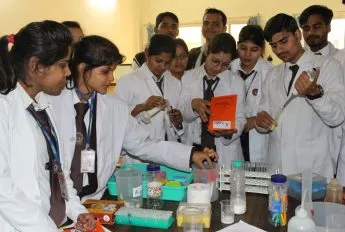
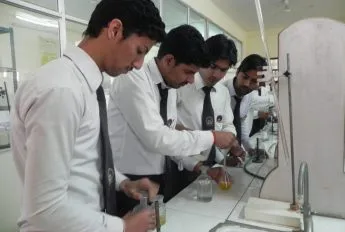
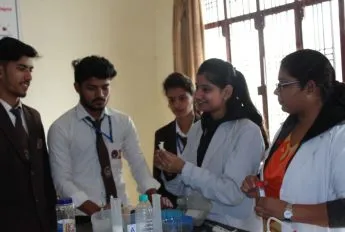
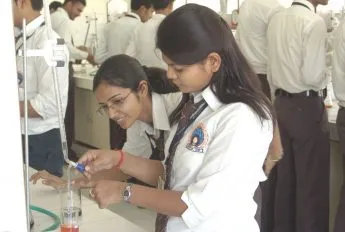
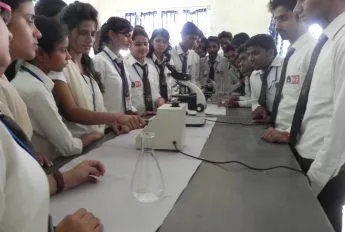
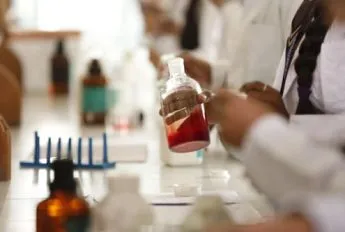
- Address
NH-24, Bakshi Ka Talab, Sitapur Road, Lucknow-226201 (UP) India - Phone
8756008853, 9161888853, 18001020833 (Toll Free) - Email
admissions@rrgi.in - rrimtedu@gmail.com
Department of Bio-Technology
Bio technology has wide areas of application in Agriculture, Animal Husbandry, development of Medicines and Vaccine, treatment of prolonged disease, pollution control and waste management and ecological conservation, energy production and conservation and many more. A Biotech college in Lucknow has enormous potential to produce batches of efficient & accomplished engineers who can shape the very economy of Uttar Pradesh with their trade.
Vision
To become a centre of excellence and develop biotechnologists to formulate ethical solutions for the betterment of mankind.
Mission
- Enabling environment for effective teaching learning process with incorporation of multidisciplinary approaches to meet the global challenges.
- Generating trained man power groomed in advance techniques to make employable and successful entrepreneur.
- Imparting professional, social and ethical values for solving the Biotechnological problems of society, nation and the world at large.
Program Educational Objectives (PEOs)
- Graduate will excel in higher education, employability & related domains with the help of multidisciplinary tools and techniques.
- Graduates will be able to identify and solve the real life problems with their critical thinking and ability to innovate.
- Graduates will be skilled with a zeal for continuous learning for their professional career.
Program Outcome (POs)
Identify, formulate, review research literature, and analyse complex engineering problems reaching substantiated conclusions using first principles of mathematics, natural sciences, and engineering sciences.
Design solutions for complex engineering problems and design system components or processes that meet the specified needs with appropriate consideration for the public health and safety, and the cultural, societal, and environmental considerations.
Use research-based knowledge and research methods including design of experiments, analysis and interpretation of data, and synthesis of the information to provide valid conclusions.
Create, select, and apply appropriate techniques, resources, and modern engineering and IT tools including prediction and modelling to complex engineering activities with an understanding of the limitations.
Apply reasoning informed by the contextual knowledge to assess societal, health, safety, legal and cultural issues and the consequent responsibilities relevant to the professional engineering practice.
Understand the impact of the professional engineering solutions in societal and environmental contexts, and demonstrate the knowledge of, and need for sustainable development.
Apply ethical principles and commit to professional ethics and responsibilities and norms of the engineering practice.
Function effectively as an individual, and as a member or leader in diverse teams, and in multidisciplinary settings.
Communicate effectively on complex engineering activities with the engineering community and with society at large, such as, being able to comprehend and write effective reports and design documentation, make effective presentations, and give and receive clear instructions.
Demonstrate knowledge and understanding of the engineering and management principles and apply these to one’s own work, as a member and leader in a team, to manage projects and in multidisciplinary environments.
Recognize the need for, and have the preparation and ability to engage in independent and life-long learning in the broadest context of technological change.
FACULTY OF Bio-Technology

DHEERENDRA KUMAR
HOD (M.Sc. Biology)

HIMANI KULSHRESTHA
ASST PROFESSOR (Ph. D.)

AMIT KUMAR MANI TIWARI
ASST PROFESSOR (Ph.D.)

ARUN KUMAR VERMA
ASST PROFESSOR (M.Tech.)

SWATI SINGH
ASST PROFESSOR (M.Tech.)

SHUBHAM RAI
ASST PROFESSOR (M. Tech.)

TABREJ JAFFAR
PROFESSOR (Ph.D.)

PRADEEP KUMAR RAO
ASST PROFESSOR (M.Tech.)

AKHILESH KUSHWAHA
ASST PROFESSOR (M.Tech.)

MANOJ SINGH
ASSOCIATE PROFESSOR (Ph.D.)

SHIBYENDU NIKHAR
ASST PROFESSOR (M.Tech.)

ASHISH PANDEY
ASST PROFESSOR (Ph.D.)

ALKA SAXENA
ASSOCIATE PROFESSOT (Ph. D.)

PAWAN KUMAR
ASSOCIATE PROFESSOR (Ph.D.)

AJIJUR REHMAN
ASST PROFESSOR (Ph.D.)

UDAY KUMAR GUPTA
ASST PROFESSOR (M.Tech.)

GOPAL JEE TIWARI
ASST PROFESSOR (M.Tech.)

HEMANT KUMAR SHARMA
ASST PROFESSOR (M. Tech.)
PROGRAM SPECIFIC OUTCOME (PSOs)
- The ability to build a bright career in biotechnology fields like pharmaceutical, microbiology, medical technology along with competence of working in multidisciplinary projects.
- The ability to apply the existing and innovative theoretical and practical knowledge to handle unpredictable situation such as biological war, chemical war and pandemics.
Duties of a Biotechnology Engineer
- Biotech Engineers involve in medical processes such as getting organisms to produce new drugs or using stem cells to regenerate damaged human tissues and re-grow entire organs.
- Biotechnologist involves industrial processes such as the production of new chemicals or the development of new preservative that can be used for food storage.
- Biotech Engineers deal with medical devices, and instruments used in hospitals & medical labs.
- Biotech Engineers also deal with bioinformatics which involves the use of applied mathematics, informatics, statistics, computer science, artificial intelligence, chemistry, and biochemistry
- Biotechnology experts develop hybrid plants and evolve processes such as the development of pest-resistant grains or the accelerated evolution of disease-resistant animals.
As an undoubted leader among Biotechnology Colleges in Lucknow, RRIMT provides state-of-the-art facilities and the most accomplished faculty for a biotech college in Lucknow to produce the Bio Technocrats of Tomorrow.
The laboratories established by the department are as follows :
- Biochemistry Lab
- Microbiology Lab
- Immunology Lab
- Genetics & Molecular Biology Lab
- Bioinformatics Lab-I
- Bioinformatics Lab-II
- Fermentation Biotechnology Lab
- Bioprocess Engineering Lab
- Genetic Engineering Lab
- Food Biotechnology Lab
- Downstream Processing Lab